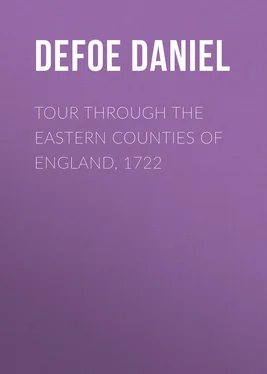Daniel Defoe - Tour through the Eastern Counties of England, 1722
Здесь есть возможность читать онлайн «Daniel Defoe - Tour through the Eastern Counties of England, 1722» — ознакомительный отрывок электронной книги совершенно бесплатно, а после прочтения отрывка купить полную версию. В некоторых случаях можно слушать аудио, скачать через торрент в формате fb2 и присутствует краткое содержание. Жанр: foreign_antique, foreign_prose, на английском языке. Описание произведения, (предисловие) а так же отзывы посетителей доступны на портале библиотеки ЛибКат.
- Название:Tour through the Eastern Counties of England, 1722
- Автор:
- Жанр:
- Год:неизвестен
- ISBN:нет данных
- Рейтинг книги:3 / 5. Голосов: 1
-
Избранное:Добавить в избранное
- Отзывы:
-
Ваша оценка:
- 60
- 1
- 2
- 3
- 4
- 5
Tour through the Eastern Counties of England, 1722: краткое содержание, описание и аннотация
Предлагаем к чтению аннотацию, описание, краткое содержание или предисловие (зависит от того, что написал сам автор книги «Tour through the Eastern Counties of England, 1722»). Если вы не нашли необходимую информацию о книге — напишите в комментариях, мы постараемся отыскать её.
Tour through the Eastern Counties of England, 1722 — читать онлайн ознакомительный отрывок
Ниже представлен текст книги, разбитый по страницам. Система сохранения места последней прочитанной страницы, позволяет с удобством читать онлайн бесплатно книгу «Tour through the Eastern Counties of England, 1722», без необходимости каждый раз заново искать на чём Вы остановились. Поставьте закладку, и сможете в любой момент перейти на страницу, на которой закончили чтение.
Интервал:
Закладка:
Passing Bow Bridge, where the county of Essex begins, the first observation I made was, that all the villages which may be called the neighbourhood of the city of London on this, as well as on the other sides thereof, which I shall speak to in their order; I say, all those villages are increased in buildings to a strange degree, within the compass of about twenty or thirty years past at the most.
The village of Stratford, the first in this county from London, is not only increased, but, I believe, more than doubled in that time; every vacancy filled up with new houses, and two little towns or hamlets, as they may be called, on the forest side of the town entirely new, namely Maryland Point and the Gravel Pits, one facing the road to Woodford and Epping, and the other facing the road to Ilford; and as for the hither part, it is almost joined to Bow, in spite of rivers, canals, marshy grounds, &c. Nor is this increase of building the case only in this and all the other villages round London; but the increase of the value and rent of the houses formerly standing has, in that compass of years above-mentioned, advanced to a very great degree, and I may venture to say at least the fifth part; some think a third part, above what they were before.
This is indeed most visible, speaking of Stratford in Essex; but it is the same thing in proportion in other villages adjacent, especially on the forest side; as at Low Leyton, Leytonstone, Walthamstow, Woodford, Wanstead, and the towns of West Ham, Plaistow, Upton, etc. In all which places, or near them (as the inhabitants say), above a thousand new foundations have been erected, besides old houses repaired, all since the Revolution; and this is not to be forgotten too, that this increase is, generally speaking, of handsome, large houses, from £20 a year to £60, very few under £20 a year; being chiefly for the habitations of the richest citizens, such as either are able to keep two houses, one in the country and one in the city; or for such citizens as being rich, and having left off trade, live altogether in these neighbouring villages, for the pleasure and health of the latter part of their days.
The truth of this may at least appear, in that they tell me there are no less than two hundred coaches kept by the inhabitants within the circumference of these few villages named above, besides such as are kept by accidental lodgers.
This increase of the inhabitants, and the cause of it, I shall enlarge upon when I come to speak of the like in the counties of Middlesex, Surrey, &c, where it is the same, only in a much greater degree. But this I must take notice of here, that this increase causes those villages to be much pleasanter and more sociable than formerly, for now people go to them, not for retirement into the country, but for good company; of which, that I may speak to the ladies as well as other authors do, there are in these villages, nay, in all, three or four excepted, excellent conversation, and a great deal of it, and that without the mixture of assemblies, gaming-houses, and public foundations of vice and debauchery; and particularly I find none of those incentives kept up on this side the country.
Mr. Camden, and his learned continuator, Bishop Gibson, have ransacked this country for its antiquities, and have left little unsearched; and as it is not my present design to say much of what has been said already, I shall touch very lightly where two such excellent antiquaries have gone before me; except it be to add what may have been since discovered, which as to these parts is only this: That there seems to be lately found out in the bottom of the Marshes (generally called Hackney Marsh, and beginning near about the place now called the Wick, between Old Ford and the said Wick), the remains of a great stone causeway, which, as it is supposed, was the highway, or great road from London into Essex, and the same which goes now over the great bridge between Bow and Stratford.
That the great road lay this way, and that the great causeway landed again just over the river, where now the Temple Mills stand, and passed by Sir Thomas Hickes’s house at Ruckolls, all this is not doubted; and that it was one of those famous highways made by the Romans there is undoubted proof, by the several marks of Roman work, and by Roman coins and other antiquities found there, some of which are said to be deposited in the hands of the Rev. Mr. Strype, vicar of the parish of Low Leyton.
From hence the great road passed up to Leytonstone, a place by some known now as much by the sign of the “Green Man,” formerly a lodge upon the edge of the forest; and crossing by Wanstead House, formerly the dwelling of Sir Josiah Child, now of his son the Lord Castlemain (of which hereafter), went over the same river which we now pass at Ilford; and passing that part of the great forest which we now call Hainault Forest, came into that which is now the great road, a little on this side the Whalebone, a place on the road so called because the rib-bone of a great whale, which was taken in the River Thames the same year that Oliver Cromwell died, 1658, was fixed there for a monument of that monstrous creature, it being at first about eight-and-twenty feet long.
According to my first intention of effectually viewing the sea-coast of these three counties, I went from Stratford to Barking, a large market-town, but chiefly inhabited by fishermen, whose smacks ride in the Thames, at the mouth of their river, from whence their fish is sent up to London to the market at Billingsgate by small boats, of which I shall speak by itself in my description of London.
One thing I cannot omit in the mention of these Barking fisher-smacks, viz., that one of those fishermen, a very substantial and experienced man, convinced me that all the pretences to bringing fish alive to London market from the North Seas, and other remote places on the coast of Great Britain, by the new-built sloops called fish-pools, have not been able to do anything but what their fishing-smacks are able on the same occasion to perform. These fishing-smacks are very useful vessels to the public upon many occasions; as particularly, in time of war they are used as press-smacks, running to all the northern and western coasts to pick up seamen to man the navy, when any expedition is at hand that requires a sudden equipment; at other times, being excellent sailors, they are tenders to particular men of war; and on an expedition they have been made use of as machines for the blowing up of fortified ports and havens; as at Calais, St. Malo, and other places.
This parish of Barking is very large, and by the improvement of lands taken in out of the Thames, and out of the river which runs by the town, the tithes, as the townsmen assured me, are worth above £600 per annum, including, small tithes. Note . – This parish has two or three chapels of ease, viz., one at Ilford, and one on the side of Hainault Forest, called New Chapel.
Sir Thomas Fanshaw, of an ancient Roman Catholic family, has a very good estate in this parish. A little beyond the town, on the road to Dagenham, stood a great house, ancient, and now almost fallen down, where tradition says the Gunpowder Treason Plot was at first contrived, and that all the first consultations about it were held there.
This side of the county is rather rich in land than in inhabitants, occasioned chiefly by the unhealthiness of the air; for these low marsh grounds, which, with all the south side of the county, have been saved out of the River Thames, and out of the sea, where the river is wide enough to be called so, begin here, or rather begin at West Ham, by Stratford, and continue to extend themselves, from hence eastward, growing wider and wider till we come beyond Tilbury, when the flat country lies six, seven, or eight miles broad, and is justly said to be both unhealthy and unpleasant.
Читать дальшеИнтервал:
Закладка:
Похожие книги на «Tour through the Eastern Counties of England, 1722»
Представляем Вашему вниманию похожие книги на «Tour through the Eastern Counties of England, 1722» списком для выбора. Мы отобрали схожую по названию и смыслу литературу в надежде предоставить читателям больше вариантов отыскать новые, интересные, ещё непрочитанные произведения.
Обсуждение, отзывы о книге «Tour through the Eastern Counties of England, 1722» и просто собственные мнения читателей. Оставьте ваши комментарии, напишите, что Вы думаете о произведении, его смысле или главных героях. Укажите что конкретно понравилось, а что нет, и почему Вы так считаете.












